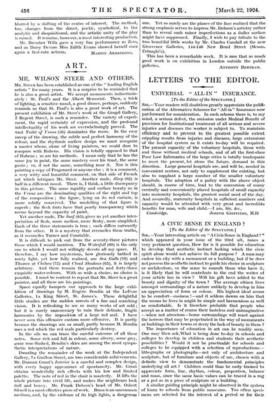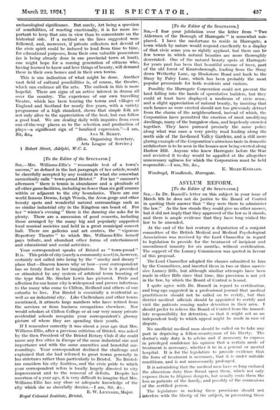A CIVIC SENSE IN ENGLAND ?
jTo the Editor of the SPECTATOR.]
Sin,—Your interesting article on "A Civic Sense in England ?" which appeared in your issue of the 23rd ult, raises a very pertinent question, How far is it possible for education to develop that aesthetic instinct lacking which the civic spirit alone would not achieve its full purpose ? A man may endow his city with a monument or a building, but if he does not possess the aesthetic instinct to guide his choice in sculpture or architecture,. or the sense to consult those •who have it, is it likely that he will contribute to the end the writer of your article has in view ? Will his gift have added to the beauty and dignity of the town ? The average citizen lives amongst surroundings of a nature unlikely to develop in him an appreciation of form or colour. His highest ideal seems to be comfort—cosiness 1—and it seldom dawns on him that the rooms he lives in might be simple and harmonious as well as comfortable. Is it therefore probable that people who accept as a matter of course their tasteless and unimaginative when not atrocious—home surroundings will react against the horrors that may be perpetrated in the way of monuments or buildings in their towns or decry the lack of beauty in them ?
The importance of education in art can be readily seen. One may then ask, What is being done to-day in schools and colleges to develop in children and students their aesthetic possibilities ? Would it not be practicable for schools and colleges to be eqnipped with a selection of reproductions— lithographs or photographs—not only of architecture and sculpture, but of furniture and objects of 'use, chosen with a definite view to demonstrate the fundamental principles underlying all art ? Children could thus be early trained to appreciate form, line, rhythm, colour, proportion, balance and mass, since the same basic values can be• -traced in a rug or a pot as in a piece of sculpture or a building.
A similar guiding principle might be observed in the system of loans to schools from public museums. Too often speci- mens- are selected for the interest of a period or for their
archaeological significance. But surely, Art being a question of sensibilities, of reacting emotionally, it is far more im- portant to keep that aim in view than to concentrate on the 'historical side. If a method on the lines suggested were followed, and, moreover, if private collectors not devoid of the civic spirit could be induced to lend from time to time, for educational purposes, from their own valuable possessions (as is being already done in one provincial town at least), one might hope for a coming generation of citizens who, having learned to know and love things of beauty, will demand these in their own homes and in their own towns.
This is one indication of what might be done. Another vast field of cultural possibilities is, of course, the theatre, which can embrace all the arts. The outlook in this is more hopeful. There are signs of an active interest in drama all over the country. The experience of our own travelling theatre, which has been touring the towns and villages of England and Scotland for nearly five years, with a variety programme of a high standard, shows that simple folk are not only alive to the appreciation of the best, but can follow a good lead. We are dealing daily with inquiries from even out-of-the-way places as to the selection and production of plays—a significant sign of " localized expression."—I am, (Hon. Organizing Secretary, Arts League of Service.)
1 Robert Street, Ade1phi, W.C. 2.















































 Previous page
Previous page